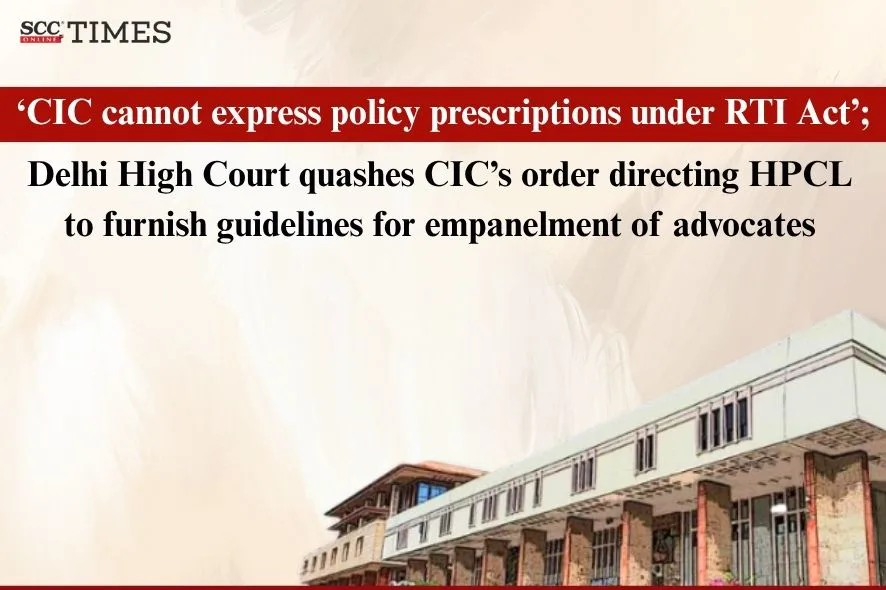Delhi High Court: In a writ petition filed under Article 226 of the Constitution assailing the order dated 27-9-2023 (impugned order), wherein the Central Information Commission (‘CIC’) issued show cause notices against two officials of Hindustan Petroleum Corporation Limited (‘HPCL’) , the Single Judge Bench of Prateek Jalan, J., held that the CIC’s order directing HPCL to furnish guidelines for empanelment of advocates was a policy prescription and was wholly ultra vires its powers under the Right to Information Act, 2005 (‘RTI Act’).
Background
Petitioner 1, HPCL was a Public Sector Undertaking of the Central Government. Petitioner 2 was a former Central Public Information Officer (‘CPIO’) of HPCL, and Petitioner 3 was HPCL’s CPIO at the time of filing of the writ petition.
The respondent was an employee of HPCL, who had, on several occasions, initiated litigations against the petitioners. The instant petition arose out of an application filed by the respondent with HPCL wherein the respondent sought a list of advocates empaneled with HPCL for the Supreme Court, High Courts, District Courts and Sessions Court. HPCL’s response had clarified that they did not empanel advocates for any court or tribunal rather the advocates are engaged on a case-to-case basis.
That response was challenged by the respondent with the First Appellate Authority (‘FAA’) wherein the FAA reiterated that HPCL did not maintain any panel of advocates but went ahead and provided a list of over 603 advocates who had appeared on behalf of HPCL in front of various courts and tribunals.
The respondent remained dissatisfied and filed a complaint with CIC under Section 18(1)(e) read with Section 20 of the RTI Act. In the complaint, it was stated that the list of advocates furnished, along with the order of the FAA, was an incomplete list, as the names of certain advocates, who had appeared on behalf of HPCL against the respondent, did not appear in the said list.
CIC, by its impugned order, had issued a show cause notice to Petitioners 2 and 3 and stated that the practice of engaging lawyers without panels is not an unfettered discretion and must be guided by some norms. According to CIC, HPCL failed to produce such guidelines and therefore Petitioners 2 and 3 were directed to show cause as to why they should not be punished for contravening provisions of the RTI Act.
The instant petition assailed the impugned order wherein the petitioners contended that CIC has no jurisdiction to enter policy issues, particularly, whether or not HPCL ought to maintain a panel of advocates. The jurisdiction under the statute is confined to furnishing of information maintained by the public authority, and a complaint under Section 18 of the RTI Act can be entertained only if the Public Information Officer (PIO) had withheld information available with it.
Per contra, the respondent’s objection was that the writ petition was premature, as the impugned order only directed issuance of show cause notices to Petitioners 2 and 3 and the Court ought not to interfere at this stage.
Analysis, Law and Decision
The Court noted that there is no universal rule prohibiting the Court from entertaining the writ petition at the show cause notice stage. Where proceedings had been taken entirely without jurisdiction, it would be open to the Court to interfere even against a show cause notice.
The Court observed that in the instant case, the dispute concerned the jurisdiction of CIC under Sections 18 and 20 of the RTI Act. HPCL had taken a clear position that the information sought by the respondent was not maintained by it at all. There was no controversy on merits or on facts, which required determination. Thus, the Court held that the instant case did not deserve to be rejected on this preliminary ground.
The Court further stated that the purpose of the RTI Act is to foster transparency in government functions by supplying information available to public authorities to the citizens. It does not require public authorities to go further and provide information which they do not maintain. Thus, the jurisdiction of CIC under Section 20 (1) of the RTI Act can only arise if the PIO has denied a request for information or knowingly given incorrect, incomplete or misleading information, which was in the possession of the public authority. CIC, however, proceeded on a completely different basis, addressing the desirability of the practice of empaneling advocates which was an observation extraneous to the issue at hand. The Court noted that CIC’s observation that HPCL failed to bring on record the guidelines conferring on them the power to engage lawyers without preparing panels was not the information sought by the respondent, and HPCL was not required to bring such information on record.
Thus, the Court held that CIC’s direction was wholly ultra vires its power under the RTI Act, was without jurisdiction and was liable to be set aside.
[Hindustan Petroleum Corporation Ltd. v. Siddhartha Mukherjee, 2025 SCC OnLine Del 5132, decided on 1-7-2025]
Advocates who appeared in this case:
For the Petitioner: Krishnan Venugopal (Senior Advocate), Sanjay Kapur, Devesh Dubey, Surya Prakash, Avinash Mathews, Advocates
For the Respondent: Dr. Puran Chand, Anita Chahal, Shashi, Surinder Kumar Virdi, Intervenor. Abhay Kumar, Amicus Curiae.



